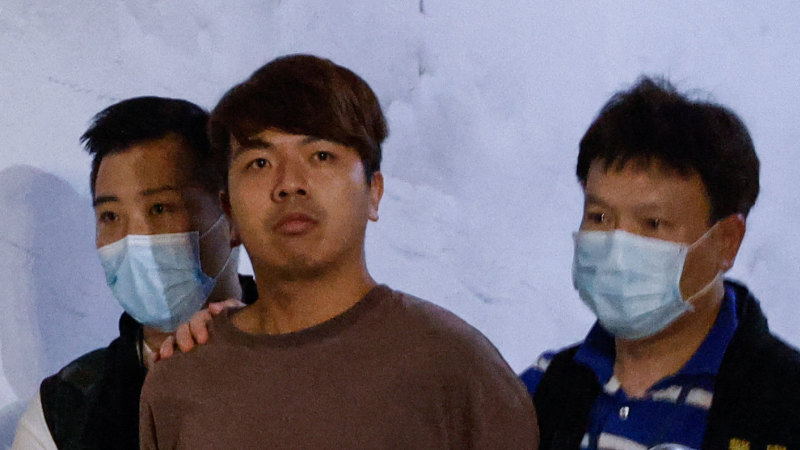Save articles for later
Add articles to your saved list and come back to them any time.
Hong Kong: Hong Kong police have arrested four men they accuse of providing financial support to people who fled overseas and are involved in activities endangering national security, escalating a high-profile crackdown on dissidents in the semi-autonomous Chinese city.
Police said the four are suspected of using companies, social media and mobile applications to receive funds that they then provided to people overseas. A police statement did not identify the four suspects or the people they allegedly supported.
Political activist Ivan Lam is one of four arrested in Hong Kong allegedly for helping dissidents who have fled overseas.Credit: Reuters
Local media, including the South China Morning Post, said the four are former members of the now-defunct pro-democracy party Demosisto, which was co-founded by Nathan Law, an activist who is now based in the United Kingdom. The newspaper Ming Pao carried a photo of former Demosisto chairperson Ivan Lam being escorted by police officers.
Authorities said the four are also suspected of making seditious social media posts. Police said the posts provoked hatred toward the Beijing and Hong Kong governments and advocated independence for the city.
On Monday, police accused eight overseas activists, including Law and two men living in Australia, of violating Hong Kong’s harsh National Security Law and offered rewards of $HK1 million ($192,000) for information leading to their arrests. The rewards are the first under the law.
Hong Kong’s leader, Chief Executive John Lee, said the eight, some of whom also live in the United States and Canada, will be pursued for life, and that anyone, including their friends and relatives, who offered information leading to their arrests would be eligible for the rewards.
Ted Hui (left) and Kevin Yam in Canberra.
Former Hong Kong legislator Ted Hui, who has settled in Adelaide with his family, and Kevin Yam, a Melbourne-based senior fellow at Georgetown University’s Centre for Asian Law, have dismissed the bounties placed on them as a stunt.
Prime Minister Anthony Albanese said on Wednesday it was “unacceptable” that Hong Kong had put bounties on two Australian residents.
Christopher Mung, a trade union activist now living in London, said the bounty was an attempt to strike fear in pro-democracy activists both in Hong Kong and overseas, that would not work.
“If we stop what we’re doing because of the fear, because of this type of intimidation, we are actually going to encourage the Chinese government to do more intimidation, to do more arrest warrants, and that is unacceptable,” he told reporters in Britain’s parliament.
The move by police on Monday also quickly drew criticism from other Western governments, which took issue with the extraterritorial application of the security law, imposed by Beijing following massive pro-democracy protests in Hong Kong in 2019.
The four arrests further intensified a crackdown on dissidents since the protests. More than 260 people have been arrested under the security law, including many of the city’s leading pro-democracy activists.
Local media quoted unnamed sources to report that the suspects were associated with a mobile application called “Mee”, which shares information about pro-democracy businesses. The four were accused of using the platform to secure funds to support Law, the reports said.
Police said they searched the suspects’ homes and offices and seized documents and electronic communication devices. The four were arrested on suspicion of conspiracy to collude with foreign forces and commit acts with seditious intent, police said.
They said the operation was ongoing, and that they would not rule out the possibility of making further arrests.
Demosisto, which was earlier led by Law and former student leader Joshua Wong, was disbanded on June 30, 2020, the same day the security law was enacted.
Law pledged on Facebook then that he would continue to participate in the resistance movement in a personal capacity.
AP, Reuters
Get a note directly from our foreign correspondents on what’s making headlines around the world. Sign up for the weekly What in the World newsletter here.
Most Viewed in World
From our partners
Source: Read Full Article



